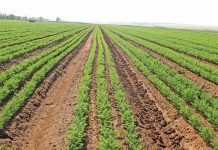Ironically, we have an excellent constitutional framework for land reform and one of the best restitution acts in the word. Our structures and procedures for the redistribution of land are well-designed and well-planned, while the process has the support of landowners, beneficiaries of land reform and the international community. So what’s gone wrong? Our problem lies with implementation. We don’t have the officials in Affairs to turn our legal framework, structures and plans into reality. Instead, their involvement has proven destructive and a source of conflict, polarisation, frustration and mistrust.
The damage done to sensitive rural economies in KwaZulu-Natal, Limpopo, Mpumalanga and some areas in the North West is irreparable. The difference between what the political leaders say and what the officials do has become too great to manage. The politicians preach about a goal in 2014 where at least 30% of agricultural land will be black-owned. So after accomplishing 4% in 14 years, we’re expected to beef it up to 26% in the next six years? To achieve this, the department has put all its hopes on a draconian new Expropriation Bill, while blaming the backlog on the willing-seller principle.
These officials won’t admit that an average of 5% of all agricultural land changes hands every year and that competent involvement in the open market could have already driven us beyond 40% of transfers over the last eight years. Because of a 32% population growth since 1994, unregistered foreigners excluded, and only a 9% increase in agricultural production, we need to be producing at least 44% more food than we produced in 1994, notwithstanding the 37% drop in production figures in the northern provinces.
For this we need a comprehensive reconstruction of the agricultural sector, with successful black commercial farmers making profits on their newly acquired land by producing competitive, quality food and earning foreign currency from exports. This ideal is a far cry from the total collapse and destruction on post-restitution farms in the northern provinces. R enowned conflict journalist Neels Blom wrote in Business Day that he’s seen the world’s greatest wars over the last three decades – Falklands, Sarajevo, Afghanistan, Bosnia, Iraq – but nowhere has he seen the kind of destruction as on restitution farms in Limpopo, where no two bricks were left on top of each other and all the orchards had been razed. Strangest of all, he wrote, was that the destroyed assets belonged to the destroyers themselves and the destruction happened after government had bought them those highly profitable farms.
The gravity of the situation The politicians have outlined an environment where proper communication and inclusive buy-in in plans to reconstruct the agricultural sector will lead to sound relations between neighbours and the sharing of capacity, equipment, expertise and experience, as in agriculture all over the world. But the reality here is that commercial farmers in Agri SA have met with the chief land claims commissioner once in the last four years, but with President Mbeki 11 times over the same period. A t the last Limpopo land reform forum at the end of 2007, the representative from the Land Claims Commission announced: “I am not prepared to discuss any of the issues which Agri and TAU North have put on the agenda. I am here to make announcements only.”
Politicians also speak of rural areas with a vibrant economy, growth in job opportunities and a quality of life for urban people to envy. But contrary to all Land Affairs’ promises that no-one will lose their jobs with the transfer of land to beneficiaries, we lost 12 500 jobs in Magoebaskloof. In Trichardsdal 915 farmworkers lost their jobs for 43 new jobs to be created, and in Letsitele Valley 1 150 jobs were destroyed to create five jobs for security guards who have not been paid for several months now.
The issue of finance
Very few farmers operate on a cash basis – we all offer our land as collateral to obtain production loans from the banks. Over the last four years, land has already lost at least 40% of its collateral value and farmers can’t get the loans they need to maintain the production of 2003/2004. Absa has already warned that the implementation of the new Expropriation Bill will change the very fibre of the banking system and that property will no longer serve as collateral. Only people with money invested at a bank will be able to borrow money from a bank. So where will production capital in agriculture come from?
The beneficiaries of restitution are not allowed to tie up their property as collateral at a bank, neither may they sell it. While one can understand the logic of limiting the risk of their losing their land again, agriculture without that kind of risk is a contradiction in terms. The unintended results are that agribusinesses are going bankrupt in small towns like Tzaneen, Hoedspruit, Hazyview and Louis Trichardt at an alarming rate because no-one can obtain financing to develop new orchards, packhouses, dams or infrastructure. With the new Bill looming, who would risk investing anything in farms anyway? Land claims commissioners already offer only 55% to 75% of value to willing sellers in restitution, with the excuse that they also take the acquisition history of the land into account.
How they measured that in establishing an offer has yet to be explained. Meanwhile grants are in limbo. In Trichardtsdal, the Sekororo community waited for 20 months for their post-settlement grants and only after losing all momentum, as well as their joint venture partners, were they informed that their business plan was now approved and that the grants were available. Eleven of 13 farms in that area have since been destroyed. And the most important reason why we are currently experiencing a dramatic increase in willing sellers is that, because of skyrocketing diesel, fertiliser, seed and electricity prices, farmers are not making profits. So they are selling their farms.
What solutions?
We must recognise that for land reform and agricultural development to succeed, we need a public/private partnership between capital or funding, legitimacy and expertise. Once you base a project on this foundation and establish due processes and proper structures to facilitate that partnership, you have a vehicle for sustainability. We will have to start by establishing inclusive land reform and agricultural development forums, preferably within the integrated development plans of fully functional municipalities and coordinated on provincial and national levels. Ownership of land reform and agricultural development programmes would then be shared by all stakeholders and no longer be the exclusive domain of officials. Ultimately, what’s at stake is the reconstruction of food security and the agricultural sector on the one continent were the majority have forgotten what it means. |fw









